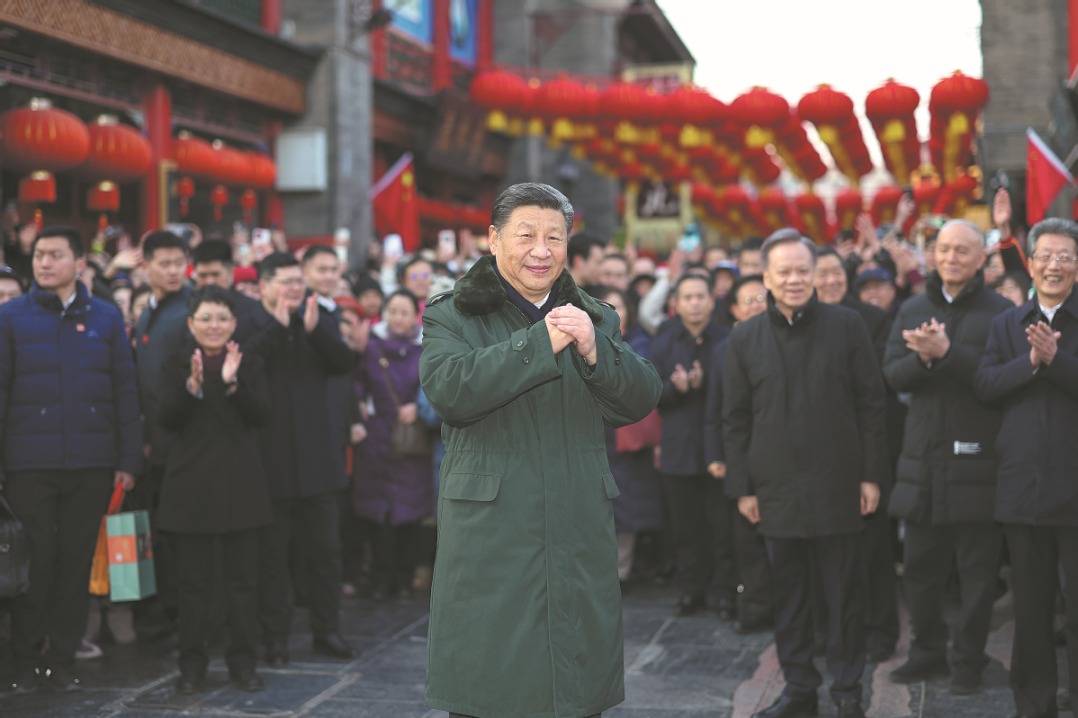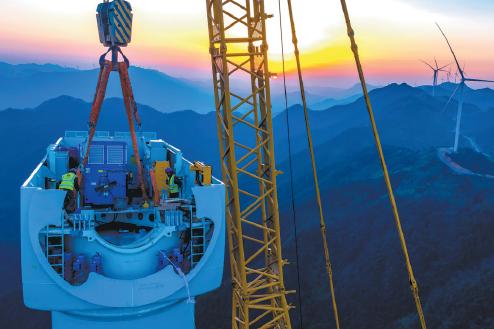Opportunity to double down
Green cooperation between China and France is delivering substantial results and is now a supporting pillar for ties


Green cooperation between China and France is delivering substantial results and is now a supporting pillar for ties
In November 2015, the two countries released the Joint Statement of Heads of State of China and France on Climate Change. Since then, the two countries have been working increasingly closely on policy coordination and pragmatic cooperation for green development and environmental protection.
In January 2018, during President Emmanuel Macron's visit to China, the two heads of state announced their decision to launch the "China-France Year of the Environment".
After Macron's second visit to China in November 2019, the two countries issued the Beijing Call for Biodiversity Conservation and Climate Change, setting a motivational example for international green initiatives.
Driven by high-level political mutual trust, the communication on environmental issues between China and France continues to improve. Green cooperation is now a pillar of their bilateral mechanisms, such as the China-France Strategy Consultations and the China-France High-Level Economic and Financial Dialogue.
In recent years, relevant departments of China and France have established a series of communication platforms, including green manufacturing working groups, green finance joint conferences and seminars on the development of the green economy, basically covering all segmented areas.
Second, green cooperation between China and France has delivered substantial results. In recent years, Chinese and French enterprises have carried out a wide range of environmental protection projects in both markets.
To promote the green transformation of traditional energy, EDF, a French electric power company, has built a solar power district energy system in Sanya, Hainan province, and a biomass heat network in Lingbao, Henan province. China General Nuclear Power Group has won tenders for France's first floating offshore wind pilot projects and a large-scale ground-mounted solar plant.
To help with energy conservation, Schneider Electric of France and China National Building Material Group have carried out strategic cooperation to provide solutions to save energy and reduce greenhouse gas emissions in China, making Schneider Electric the first foreign company to respond to the China-France green manufacturing partnership initiative.
In terms of the circular economy, SUEZ Group of France and China-Singapore Suzhou Industrial Park in China have collaborated on sludge treatment and resource utilization projects, creating an outstanding practical demonstration of effective waste recycling, energy saving and emissions reduction.
Notable results in green manufacturing include: the cooperation between Air Liquide Group of France and SAIC Motor on the development of hydrogen vehicles; the zero carbon emissions pilot at L'Oreal Group's Yichang factory; and Envision AESC's $2.9 billion investment in a battery factory in France to facilitate the development of clean energy vehicles.
As for green finance, the Paris branch of Bank of China issued two green bonds totaling $2 billion in 2017 and 2020; in 2022, four French-funded banks, including BNP Paribas, Industrial Bank, Crédit Agricole CIB and Natixis, jointly provided $80 million of non-recourse project financing in China's renewable energy sector.
Third, China and France have been stepping up their coordination on multilateral green cooperation. Despite the many challenges confronting multilateralism, China and France have been focusing on green topics to steer global governance and continuously enhance their global leadership position.
In April 2021, at the invitation of President Macron, President Xi Jinping attended a virtual climate summit with France and Germany, where the leaders of the three countries reached a consensus on cooperating to address climate change and building a China-EU green partnership.
In October 2021, the seventh IUCN World Conservation Congress and the 15th meeting of the Conference of the Parties to the UN Convention on Biological Diversity (COP 15) were held in Marseille, France and Kunming, China, respectively. French President Macron was the only Western head of state to participate, delivering a keynote speech by video.
This year marks the 15th anniversary of the establishment of the China-France partnership on climate change. President Macron's visit to China will strengthen bilateral communication and cooperation in the areas of climate change and biodiversity.
The ongoing Russia-Ukraine conflict is prompting profound adjustments in the relations among major powers. The economic sanctions imposed by the West on Russia, at the instigation of the United States, have led to fluctuations in the global energy market and an energy supply crisis, which has had all-encompassing impacts on Europe's political, economic and social development.
With Europe pushed to adjust its energy structure and accelerate the transition from fossil fuels to clean energy, green cooperation between China and France will welcome new growth opportunities.
In May 2022, the REPower EU plan set out carbon reduction targets for the use of renewable energy and improved energy efficiency. These included some energy sectors, such as photovoltaics and wind power, that Chinese companies can contribute their technological and scale advantages to.
France has proposed an energy transition strategy to complement renewable energy sources such as offshore wind power and photovoltaic power with nuclear energy based on EPR2 technology. According to this transition plan, by 2050, France will multiply its solar energy capacity tenfold to over 100 GW, deploy 50 offshore wind farms aiming for 40 GW, and double its onshore wind power capacity. As of now, the development of renewable energy in France is not fast enough and needs to be accelerated. Demands for Chinese products are enormous: the rare earth elements needed to produce renewable energy equipment are mainly mined and refined in China, and China's manufacturing and assembly capacity for renewable energy account for more than half of the world's total.
With the US charging high prices for energy and the supply from Russia cut off, China can be seen as the only practical international partner available for France, and even the European Union as a whole, on their way to realizing their energy transition.
In addition, China's market for low-carbon products has broad prospects and is highly attractive to French companies with characteristic technologies. Green cooperation is replacing the traditional aviation, aerospace and civil nuclear energy projects to become a new growth engine for pragmatic economic cooperation between China and France.
With the roll-out of the China-France Third-Party Market Cooperation Pilot, this cooperation has become an important platform to combine Chinese capital and construction experience with French technology and operational experience, which can also be applied well to green projects. For example, China and France have a strong interest in projects involving jointly developing new energy and environmental protection in Africa.
The author is an associate researcher of the Institute of European Studies at the Chinese Academy of Social Sciences. The author contributed this article to China Watch, a think tank powered by China Daily. The views do not necessarily reflect those of China Daily.
Contact the editor at editor@chinawatch.cn
































